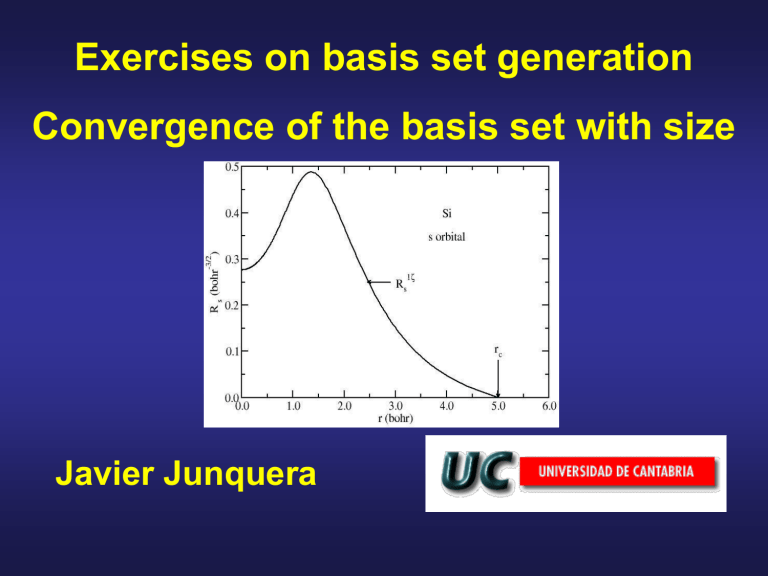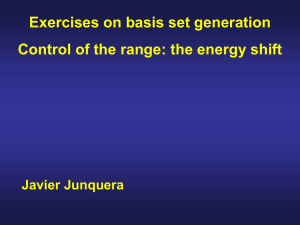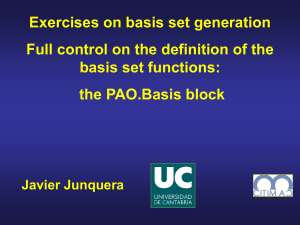PowerPoint Version

Exercises on basis set generation
Convergence of the basis set with size
Javier Junquera
Most important reference followed in this lecture
Bulk Si, a semiconductor that crystallizes in the diamond structure
Go to the directory with the exercise on the default basis set
Inspect the input file, Si.default.fdf
More information at the Siesta web page http://www.icmab.es/siesta and follow the link Documentations, Manual
As starting point, we assume the theoretical lattice constant of bulk Si
FCC lattice
Two atoms in the basis
Sampling in k in the first
Brillouin zone to achieve self-consistency
For each basis set, a relaxation of the unit cell is performed
Variables to control the Conjugate Gradient minimization
Two constraints in the minimization:
- the position of the atoms in the unit cell
- the shear stresses are nullified to fix the angles between the unit cell lattice vectors to 60 ° , typical of a fcc lattice
Size (number of basis set per atom)
Depending on the required accuracy and available computational power
Quick exploratory calculations
Highly converged calculations
Minimal basis set
(single-
ζ; SZ)
Multipleζ
+
Polarization
+
Diffuse orbitals
+ Basis optimization
The size of the basis size can be controlled easily by the user: PAO.Basis Size
Simply use the tag PAO.BasisSize. It admits four different values
SZ Single-zeta (Singleζ)
DZ Double-zeta (Doubleζ)
SZP Single-zeta plus polarization
DZP Double-zeta plus polarization
Default: DZP (see exercise “Default”)
More complete basis set requires the explicit use of the block PAO.Basis
Relax the lattice constant and compute the energy for the different basis set sizes
Run the code for bulk Si with the default basis set siesta < Si.sz.fdf > Si.sz.out
Single-zeta (Singleζ, SZ) siesta < Si.dz.fdf > Si.dz.out
Double-zeta (Doubleζ, DZ) siesta < Si.szp.fdf > Si.szp.out
Single-zeta plus polarization (SZP) siesta < Si.dzp.fdf > Si.dzp.out
Double-zeta plus polarization
(DZP)
The numbers in this exercise have been obtained with siesta-3.0-b, compiled with the g95 compiler and double precision in the grid.
Numbers might change slightly depending on the platform, compiler and compilation flags
Relax the lattice constant and compute the energy for the different basis set sizes
Edit the output files and analyze the size of the basis set.
To understand the block PAO.Basis
, see the exercise “Default”
DEFAULT
Study the structural and energetic properties as a function of the size of the basis size
Inspect the output files and search for the relaxed structure and Kohn-Sham energy
We are interested in this number
Study the structural and energetic properties as a function of the size of the basis size
Inspect the output files and search for the relaxed structure and Kohn-Sham energy
SZ DZ
SZP DZP
Study the structural and energetic properties as a function of the size of the basis size
Inspect the output files and search for the relaxed structure and Kohn-Sham energy
SZ DZ
SZP DZP
Study the structural and energetic properties as a function of the size of the basis size
J. Junquera et al., Phys. Rev. B 64, 235111 (2001)
Results in previous table have been obtained with optimized basis set, but the tendency is the same as in our example
Study the structural and energetic properties as a function of the size of the basis size
Nice convergence of the total energy with respect the basis set size
The problem is variational: the larger the number of orbitals in the basis set, the lower the energy
For the particular case of Si, the polarization orbitals (3d shell) are very important for convergence, more than doubling the basis.
J. Junquera et al.,
Phys. Rev. B 64, 235111 (2001)
Results in previous figures have been obtained with optimized basis set, but the tendency is the same as in our example










